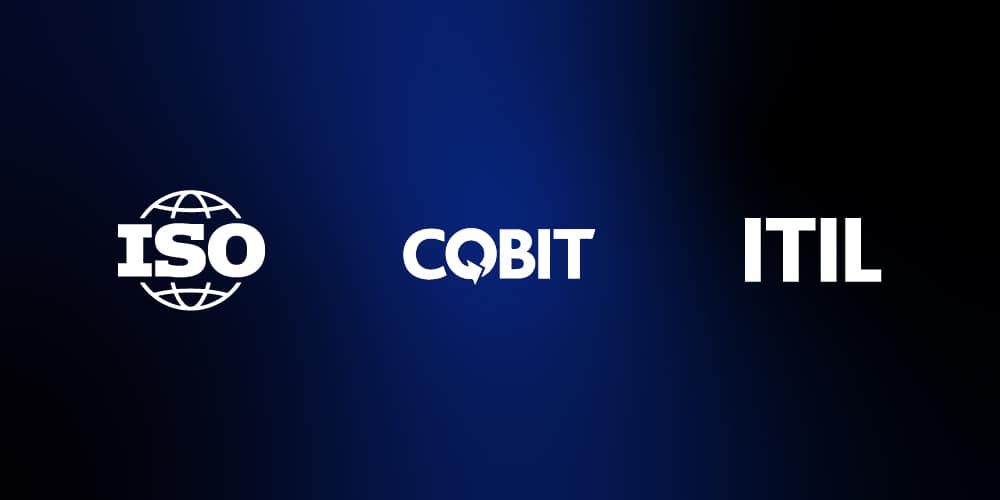What are the consequences of not complying with international norms and standards related to your organization?
Fines? Difficulty in entering international and more regulated markets? Not being able to match the quality and efficiency of competitors in your industry?
In addition to helping you avoid these problems, international norms and standards serve the dual purpose of:
- Define the path to international success.
- Protect your business interests.
However, since not all business processes and standards apply to all companies, we have several options that coexist and must address to achieve success.
That is why we bring you three of the most recognized international norms and standards regarding IT: ISO, COBIT, and ITIL.
Why comply with international norms and standards: ISO, COBIT, and ITIL?
These are some of the advantages that compliance with international standards brings to your organization:
- High-quality products or services
- Increased operational efficiency
- Increased customer satisfaction
- Competitive advantage
- Increased brand value
- Secure organizational digital infrastructure
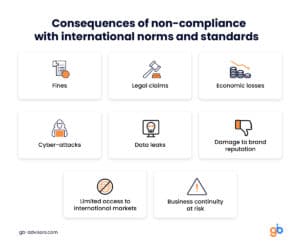
ISO, COBIT and ITIL: What are the differences between these norms?
ISO
What are ISO standards? ISO is the acronym for International Standard Organization.
These international norms and standards are here to find efficiency and economic profitability when applied to processes, products, and services.
What are the most important ISO standards?
- Quality management (ISO 9000)
- Environmental management (ISO 14000)
- Health and safety (ISO 45000)
- Energy management (ISO 50001)
- Food safety (ISO 22000)
- Information security (ISO/IEC 27000)
ISO also has a compendium of norms and standards for IT, corresponding to ISO/IEC 20000.
Of all the international norms and standards designed for this sector, ISO/IEC 20000 was one of the first created.
What is ISO/IEC 20000 specifically about? This standard compiles the processes focused on the effective management of IT services, both for internal and external customers.
The ISO 20000 standards stay in two documents:
ISO 20000-1: Covers the mandatory requirements for providing IT services. It pursues effectiveness and efficiency in service management for companies and their customers.
ISO 20000-2: Details the set of practices for service management related to the first document.
Now, let’s see, from your company’s IT perspective, what are the advantages and disadvantages of the ISO Standards:
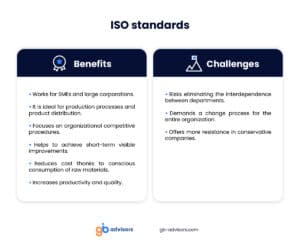
COBIT
Control Objectives for Information Technologies, or COBIT, is a set of tools to ensure the control and monitoring of information systems governance.
Based on its most recent update in 2019, this framework compiles best practices raised by IT experts from various sectors such as industry and services.
This guide compiles and organizes from the creation of information to its final disposition.
Its objective is to guarantee precise quality control that allows for establishing and maintaining standards of quality and reliability of the technological systems of any organization.
COBIT Domains
COBIT relays on 34 processes grouped into these four domains:
Planning and Organization: Seeks to enforce efficient technology use to achieve business objectives.
Acquisition and Implementation: Defines, acquires, adjusts, and implements the technologies that align with the company’s business processes.
Delivery and Support: Guarantees the effectiveness and efficiency of the current technological systems.
Monitoring: Ensures that implemented solution corresponds to the company’s strategic needs.
Now, we summarize for you the benefits and challenges of complying with COBIT international norms and standards:
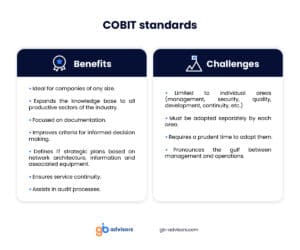
The Information Technology Infrastructure Library, or ITIL for short, is a collection of best practices for effective Information Systems management.
It was conceived in 1986 by the Central Computer and Telecommunications Agency (CCTA) of Great Britain, and its most updated version is V4, published in 2019.
This latest version aims to adapt information systems management to new agile methodologies such as DevOps.
Since its appearance, ITIL v4 has four new dimensions complemented by new principles following the track of those proposed in the agile manifesto.
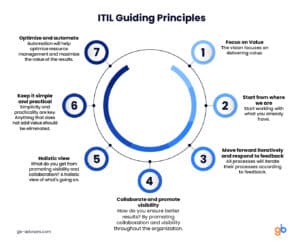
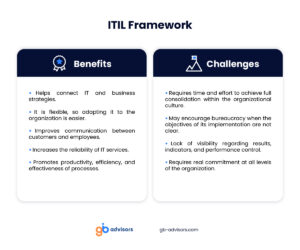
Benefits of compliance with international norms and standards
Although there are others, the international norms and standards of ISO, COBIT, and ITIL are the most recognized and adopted by companies.
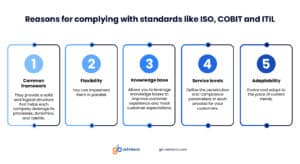
Which of these international norms and standards should your company comply with?
As for international norms and standards such as COBIT 2019, ITIL v4, or ISO 20000, any company whose IT operations are critical to the business needs to abide by these standards.
What does this mean? When operations and the business, in general, depend on the quality, efficiency, and reliability of IT, these international norms and standards allow you to focus efforts to improve on these aspects.
This should be determined precisely by your organization’s Compliance Department (if there is one).
In any case, the important thing is to identify the rules and regulations corresponding to the type of industry in which your organization operates.
You should also take into account the specific requirements of each regulation, as well as the particular territories and legislations of the countries where your organization operates.
Remember that any action aimed at improving compliance with international norms and standards must be supported by the technical knowledge of the areas involved in your organization.
In this way, you ensure the success of your efforts and avoid monetary losses related to fines or wasted efforts.
